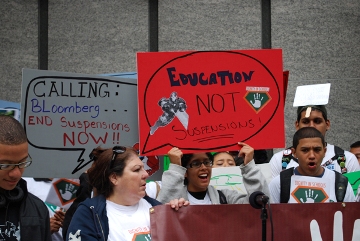DSC-NY Rally to Challenge Latest Draft of NYC School Discipline Code

The New York City Department of Education held a public hearing last week to review a new draft of the Discipline Code, which included some positive steps towards limiting the number of minor infractions that subject students to suspension. While students and parents with the Dignity in Schools Campaign-New York acknowledge the changes as a step in the right direction, they maintain the changes are not substantial enough.The Code still lists 25 infractions for which middle and high school students can be suspended for an entire school year.
“More than 73,000 students were suspended in 2010-2011, that number should be of students graduating, not being suspended,” said Aiesha Vegas, an 18 year-old student at Satellite Academy in the Bronx and a leader at Youth on the Move. “When kids are getting suspended and they come back to school and they’re behind, they feel more discouraged, and that’s why they end up cutting school, which leads to them getting arrested, and which leads to them not graduating.”
On Tuesday, June 5, students, parents, teachers, and education advocates turned out in large numbers to rally and testify at the public hearing at Stuyvesant High School in lower Manhattan. Speakers at the rally called upon the Department of Education (DOE) to make more substantive changes to the code to reduce suspensions by 50% by September 2013, including eliminating suspensions for the first three levels of school misconduct, such as insubordination, pushing and shoving, and requiring that schools use positive guidance interventions before they can suspend students for behaviors like fighting in Levels 4 and 5 of the Code.
“My brother got suspended for wearing a sweatshirt in school. He felt so targeted in that school that eventually he dropped out. Each suspension plays a role in the long run of students' educational careers. When a student misses a class they miss important information needed to pass their classes; eventually it becomes easier to fail and drop out of high school,” said Adilka Pimentel, a member of Make the Road New York. “Schools need to implement and REQUIRE the use of positive interventions and alternative to suspensions. I am worried that if these types of changes are not made that more students like my brother and sister will continue to be pushed out of school and not on the path to graduation.”
Speaker of the New York City Council and leading candidate for Mayor, Christine C. Quinn wrote a letter to Dennis M. Walcott, chancellor of the New York City Department of Education, in which she applauded the city’s effort to start moving away from punitive measures, but called for even more changes to the code. In her letter, Ms. Quinn called upon the chancellor to provide more training for teachers and principals.
This past week, Community Asset Development Re-defining Education (CADRE), a member of the DSC-Los Angeles chapter, along with Restorative Justice Partners (RJP) and Human Impact Partners (HIP), published a study that found that students in schools that had zero-tolerance policies, which frequently result in expulsion or arrest, had higher stress levels than students enrolled in schools that practiced positive behavior interventions and supports (PBIS) or restorative justice (RJ) programs. Additionally, the study found that schools with PBIS and RJ programs were more likely to have higher grades, test scores, and attendance records than schools with zero-tolerance policies.
Supporters of zero-tolerance policies believed they would sustain and preserve a safe environment for students to learn, but this new report from Los Angeles, as well as data from the Office of Civil Rights and recent reports from the Council on State Governments, show that zero-tolerance not only fails to prevent misbehavior and create safer schools, it is also an obstacle for students’ growth, contributing to the achievement gap and dropout. Just last week, Texas teenager Diane Tran was fined and sentenced to 24 hours in jail for being late to school and missing class. Why was the 17 year-old missing classes? Diane Tran was taking college-level classes while working two jobs to support her younger siblings after her parents divorced. Young people like Diane are being criminalized and denied access to education across the country, with devastating consequences for their future. Every year, more than 3.3 million students are suspended and 1.2 million are pushed out of school. We need positive alternatives like restorative justice and positive behavior supports that improve school safety and educational outcomes for all students.
Media Coverage of DSC Rally and DOE Public Hearing:
NY1 – DOE Officials Hold Public Meeting On Revised Discipline Code
Gotham Gazette – NYC Schools Propose Changes to Discipline Code
El Diario NY – Padres Abogan por Alternativas a Suspensiones Escolares
New York Times/Schoolbook – Students and Others Rally Before Discipline Code Hearing
